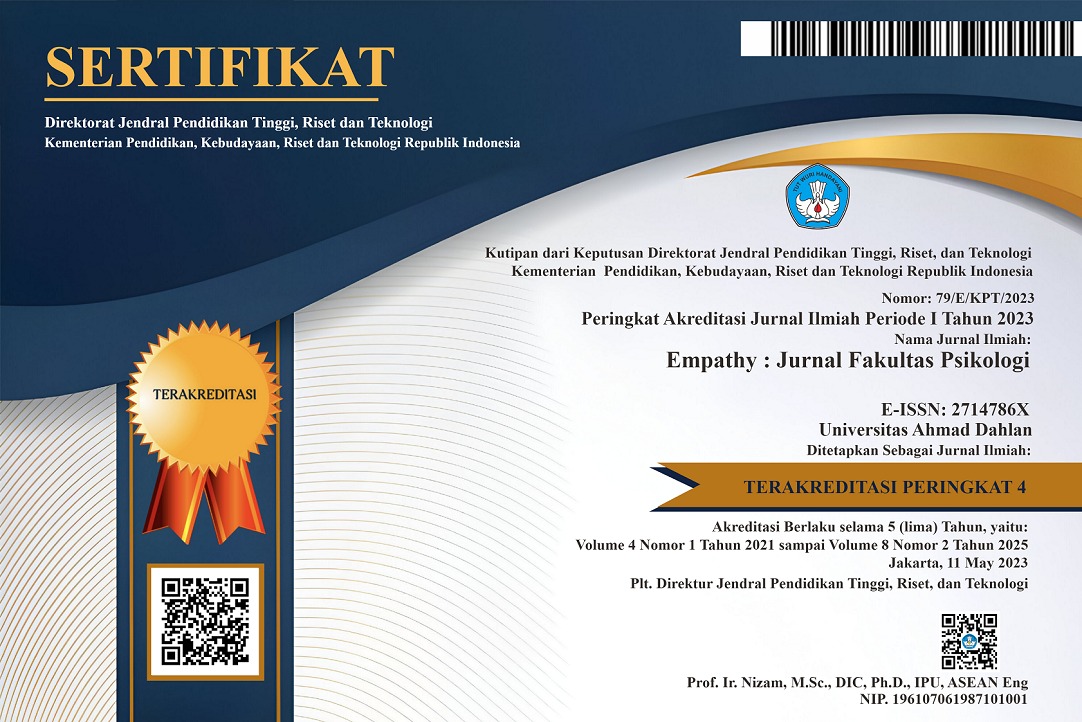Implikasi Teori Behavioristik dalam Kegiatan Pembelajaran di Sekolah
DOI:
https://doi.org/10.12928/empathy.v4i1.20048Keywords:
Learning theory, Behavioristic theory, Reinforcement, punishmentAbstract
The Implications of Behavioristic Theory in Learning Activities in Educational Institutions
Behavioristic learning theory is a learning theory that is widely applied in the learning process in Indonesia. In this theory, the change in behavior shown by students is the main indicator as a result of stimuli and responses. Students who are able to show a response in the form of behavior change are successes in the learning process. Behavioristic learning theory has a main characteristic, namely the teacher is authoritarian who acts as a controller, while students are passive and depend on the stimulus provided by teacher. The aim of applying behavioristic learning theory is so that student behavior changes as a form of response to a better direction. According to this theory, changes in behavior as a desired response will be stronger if reinforcement is given. Likewise, the unwanted response will disappear when given a punishment. This article describes the concept of behavioristic learning theory and its applications and implications in education. Behavioristic learning theory is believed to be able to bring out good behavior in students.
References
Baharuddin, J. & Wahyuni, E, N. (2008). Teori Belajar dan Pembelajaran. Yogyakarta: Ar-Ruzz Media.
Desmita. (2009). Psikologi Perkembangan Peserta Didik. Bandung: PT Remaja Rosdakarya.
Fajri, H. L. (2011). Efektivitas Teknik Behavior Contract untuk Mengurangi Perilaku Membolos Siswa Kelas X Di SMA Negeri 5 Malang. SKRIPSI Jurusan Bimbingan dan Konseling & Psikologi-Fakultas Ilmu Pendidikan UM.
Guthrie, E. R. (1946). Psychological Facts and Psychological Theory., "Psychological Bulletin" Vol. 43, 1-20.
Hamalik, O. (2002). Perencanaan Pengajaran Berdasarkan Pendekatan Sistem. Jakarta: Bumi Aksara.
Haryanto, B. (2004). Psikologi Pendidikan dan pengenalan Teori-teori Belajar, Sidoarjo. Universitas Muhammadiyah Sidoarjo.
Herpratiwi. (2016). Teori Belajar dan Pembelajaran. Yogyakarta: Media Akademi.
Kamus Besar Bahasa Indonesia (KKBI). (2017). (online), (https://kbbi.web.id), diakses pada 5 Januari 2021.
King, L. A. 2010. Psikologi Umum: Sebuah Pengantar Apresiatif. Jakarta: Salemba Humanika.
Moreno, R. (2010). Educational Psychology. University of New Mexico.
Moto, M. M. (2019). Pengaruh Penggunaan Media Pembelajaran dalam Dunia Pendidikan. Indonesian Journal of Primary Education Vol. 3 No.1.
Muhibbin, S. (2004). Psikologi Belajar. Jakarta: PT. Grafindo Persada.
Muhibbin, S. (2007). Psikologi Belajar. Jakarta: PT. Grafindo Persada.
Mukminan. (1997). Teori Belajar dan Pembelajaran. Yogyakarta: P3G IKIP Yogyakarta.
Nahar, N. I. (2016). Penerapan Teori Belajar Behavioristik Dalam Proses Pembelajaran. Nusantara (Jurnal Ilmu Pengetahuan Sosial). Volume 1 Desember 2016.
Nasution. (2006). Asas-Asas Kurikulum. Jakarta: Bumi Aksara.
Oktariska, B., Toenlioe, A. J. E. & Susilaningsih, S. (2018). Studi Kasus Penerapan Teori Belajar Behavioristik dalam Menumbuhkembangkan Perilaku Peduli Lingkungan Hidup Siswa di SMKN 6 Malang. Jurnal Kajian Teknologi Pendidikan Vol. 1 No. 2.
Putrayasa, I. B. (2013). Landasan Pembelajaran. Bali: Undiksha Press.
Santrock, J. W. (2011). Educational Psychology. University of Texas at Dallas.
Sihkabuden, S. (2017). Hubungan antara Gaya Kognitif, Motivasi Berprestasi, dan Lokus Kendali dengan Perolehan Belajar Siswa SMU. Universitas Negeri Malang , 2009. http://journal.um.ac.id/index.php/ilmu-pendidikan/article/view/945.
Sihkabuden. (2012). Handout dan Transparasi Kuliah Belajar dan Pembelajaran. Malang: Universitas Negeri Malang.
Slameto. (2010). Belajar & Faktor-Faktor Yang Mempengaruhi. Jakarta: Rineka Cipta.
Slavin, R.E. (2000). Educational Psychology: Theory and Practice. Massachusetts: Allyn and Bacon.
Sugandi, A. (2007). Teori Pembelajaran. Semarang: UPT MKK UNNES.
Suyono & Hariyanto. (2011). Belajar dan Pembelajaran. Bandung: PT Remaja Rosdakarya.
Vygotsky, L. S. (1978). Mind in Society: The Development of Higher Psychological Processes. Cambridge, MA: Havard University Press.
Downloads
Published
Issue
Section
License
Authors who publish with Empathy: Jurnal Fakultas Psikologi agree to the following terms:
- Authors retain copyright and grant the journal right of first publication with the work simultaneously licensed under a Creative Commons Attribution License (CC BY-SA 4.0) that allows others to share the work with an acknowledgment of the work's authorship and initial publication in this journal.
- Authors are able to enter into separate, additional contractual arrangements for the non-exclusive distribution of the journal's published version of the work (e.g., post it to an institutional repository or publish it in a book), with an acknowledgment of its initial publication in this journal.
- Authors are permitted and encouraged to post their work online (e.g., in institutional repositories or on their website) prior to and during the submission process, as it can lead to productive exchanges, as well as earlier and greater citation of published work.

This work is licensed under a Creative Commons Attribution-ShareAlike 4.0 International License.



